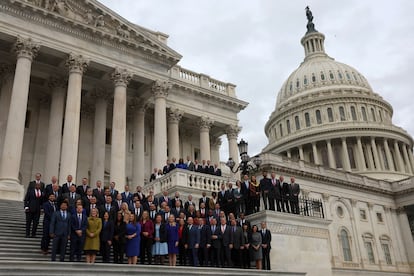What the Republican victory in the House of Representatives means for Biden
Conservatives could work to ease Trump’s legal troubles, limit the “blank check” to Ukraine and impeach various Democratic government officials


Out of the many unknowns created by the Republican Party’s agonizing victory in the House of Representatives (where they secured a majority eight days after the midterm elections of November 8), three stand out above the rest. Will they use their newly regained power to exempt former President Donald Trump from facing the same legal consequences for his alleged crimes as any other citizen? Will the United States continue to show the same determined support for Ukraine as it defends itself from the Russian invasion? And will conservatives use their power in the lower house to use the debt ceiling as leverage in budget negotiations?
For the past two years, President Joe Biden has enjoyed support from the House and the Senate, both controlled by Democrats. It is a privilege that tends to be short-lived for the tenants of the White House: they usually lose support at the midterm elections, which are traditionally considered a test of the party in power.
From now on, the executive will have the backing of the upper house, which the Democrats have secured, but not of the lower one, where the Republicans’ advantage could be in the range of seven seats, a lot fewer than expected. It will be in their power to make Biden’s life miserable, as they have promised to do, but not as freely as they would have liked. Although the president has veto power over legislation coming out of the House, it is foreseeable that Republicans will push through doomed bills simply to send messages to constituents about their agenda priorities.
When he was sworn in, Biden expressed his determination to unite the country. He promised to leave behind the legacy of Donald Trump, polarizer-in-chief, but almost two years later, the confrontation between the two blocs is more intense than ever. Voters have signaled their discontent with runaway inflation, crime in the big cities and the immigration crisis on the southern border. The Democratic president also walked into his office with an ambitious economic plan, a sort of New Deal 2.0, in the spirit of Franklin D. Roosevelt. A two-year period is now opening up during which the most he can hope for, in terms of his domestic agenda, is to defend the achievements of the first half of his term on issues such as infrastructure, curbing climate change, student debt cancellation or drug pricing subsidies. Everything indicates that his next objectives, which included changes in electoral legislation and encoding women’s reproductive rights, will have to wait.
The first thing that will change, when the new configuration takes shape early next year, is control of the House of Representatives. The speakership will pass from the veteran Nancy Pelosi, a San Francisco Democrat who has been in Congress for 35 years and has served as House speaker twice (2007 to 2011, and 2019 to the present), to another Californian, Kevin McCarthy. Something of an unknown quantity, McCarthy is a politician whose most notable feature is his loyalty to Trump, who on Wednesday announced his third run for the White House. He has also been defined by his ambition to secure a post that is now finally his. Pelosi’s future is also unclear.
These are the issues that, under McCarthy, could encourage acrimonious debate in a Republican-controlled House:

Impeachments
In a best-case scenario, this divergence in legislative control could lead to a golden era of compromise between the two parties, but the current climate of polarization counsels against such optimism. At worst, finger-in-the-eye confrontation will be the norm: the most extreme Republican wing is eager to bring impeachments against Biden, Vice President Kamala Harris, Secretary of Homeland Security Alejandro Mayorkas for his border management, and Attorney General Merrick Garland for his legal action against Trump.
McCarthy has in recent weeks attempted to curb enthusiasm for impeachment among a handful of fellow party members, in order to avoid eroding a resource intended for other purposes (it has only been used on four occasions; two of them against Trump). The majority of the Republican Party supports dropping the cases against the former president, and closing the House committee on the Capitol attack of January 6, 2021 (three of the committee members, Republicans Liz Cheney and Adam Kinzinger and Democrat Elaine Luria, have not been re-elected to their seats). Such impunity could create a dangerous precedent for subsequent White House tenants in matters such as the handling of confidential documents found by the FBI at Trump’s Mar-A-Lago residence. The announcement that Trump will run for president again could provide further political ammunition for those who argue that it is in their interest to look the other way.
Pandemic management
Republicans who have criticized the Biden administration’s response to the pandemic, as well as federal mandates for facemasks, mandatory vaccinations, and school and business closures, will now have the power to make decisions affecting health agencies, which they claim curtailed Americans’ freedom during that exceptional period of time. In addition, they will be able to launch commissions of inquiry into the management of the health crisis and the federal response to it, chiefly the $1.9 billion released to stimulate the economy after the confinement.
House conservatives have also warned that they will subpoena Anthony Fauci, the presidential medical adviser and official face of the fight against the pandemic who is retiring from his post as a top US public health official after 38 years of service. McCarthy stated in a recent interview with Fox News that he will push for an investigation into the origins of the virus. In a report, Republican senators accepted the theory that the virus originated in a Chinese laboratory, despite the fact that there is no consensus in the scientific community.
Hunter Biden
Holding Joe Biden’s youngest son accountable for his foreign business dealings, in which he is proven to have used his family connections for his own benefit in China and Ukraine, is a long-standing aspiration of the Republican Party. His bank records are likely to be requested in search of tax offenses. There are also suspicions of fraud surrounding his tax filings on millions of dollars of personal income and that he lied about his drug use when purchasing a gun. He has not been charged with any crime.
The majority in the House could also push for committees of inquiry into the chaotic withdrawal from Afghanistan last August and into China’s political and economic influence in the United States.
The debt ceiling
McCarthy has also suggested that he will use the government’s borrowing limit, commonly known as the debt ceiling, as a leverage to boost his party’s interests. “We cannot continue spending and increasing that debt,” he told the Washington-based political information website Punchbowl News.
Like a credit card, that ceiling sets a limit on how much the Treasury can borrow to pay for government spending. Once that limit is reached, lawmakers must raise the limit or risk defaulting on credit obligations. Republicans have used that technique in the past to achieve their goals: This time they could use it to advance their fiscal agenda, which includes the issue of spending on Social Security.
Support for Ukraine
The Russian invasion of Ukraine has been one of the few cases of bipartisan agreement during these past two years. The Capitol almost unanimously approved more than $66 billion in support for Kyiv after the invasion began in February. In his interview with Punchbowl News, McCarthy revealed that this could be about to change, claiming that in the middle of a looming recession, people are not willing to write “a blank check” to Ukraine. McCarthy also criticized Biden for neglecting the crisis on the border with Mexico and putting all his efforts into Ukraine instead. Biden and his administration have insisted time and again that support for Ukraine will continue “for as long as it takes.”
Climate change
One of the greatest and most unexpected achievements of Biden’s second year in the White House came in late July with the approval of the Inflation Reduction Act, which included, among other measures, an ambitious $370 billion plan to encourage the sale of electric vehicles, the use of nuclear or solar energy and the energy transition of small businesses.
That law did not garner support from congressional Republicans, whose ranks include leading global warming deniers. It is to be expected that the party will work to deactivate many of the achievements of the Biden administration in this regard and to push for fossil fuels.
Abortion
A Supreme Court ruling last June overturned Roe v. Wade, ending half a century of federal protection of abortion and returning to the states the ability to legislate on the topic. The Democrats trusted that this issue would mobilize the vote, especially among women, and they made it the mainstay of their campaign. Before the summer they tried to enact that protection into law, but failed to get it passed. Biden’s hope to shield women’s reproductive freedom is now even more remote following the Republican victory in the House. Republican Senator Lindsey Graham has proposed a federal ban on abortion after the fifteenth week of pregnancy, although many lawmakers in his own party oppose this prohibition because it undermines the state freedom consecrated by the Supreme Court, which is controlled by a conservative supermajority of six to three.
Sign up for our weekly newsletter to get more English-language news coverage from EL PAÍS USA Edition
Tu suscripción se está usando en otro dispositivo
¿Quieres añadir otro usuario a tu suscripción?
Si continúas leyendo en este dispositivo, no se podrá leer en el otro.
FlechaTu suscripción se está usando en otro dispositivo y solo puedes acceder a EL PAÍS desde un dispositivo a la vez.
Si quieres compartir tu cuenta, cambia tu suscripción a la modalidad Premium, así podrás añadir otro usuario. Cada uno accederá con su propia cuenta de email, lo que os permitirá personalizar vuestra experiencia en EL PAÍS.
¿Tienes una suscripción de empresa? Accede aquí para contratar más cuentas.
En el caso de no saber quién está usando tu cuenta, te recomendamos cambiar tu contraseña aquí.
Si decides continuar compartiendo tu cuenta, este mensaje se mostrará en tu dispositivo y en el de la otra persona que está usando tu cuenta de forma indefinida, afectando a tu experiencia de lectura. Puedes consultar aquí los términos y condiciones de la suscripción digital.








































